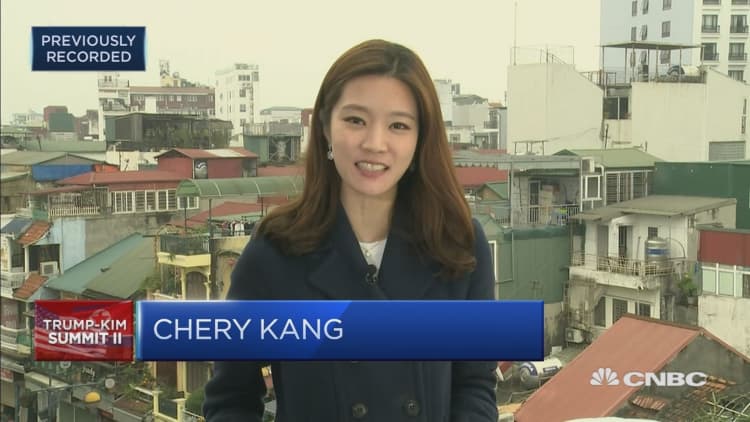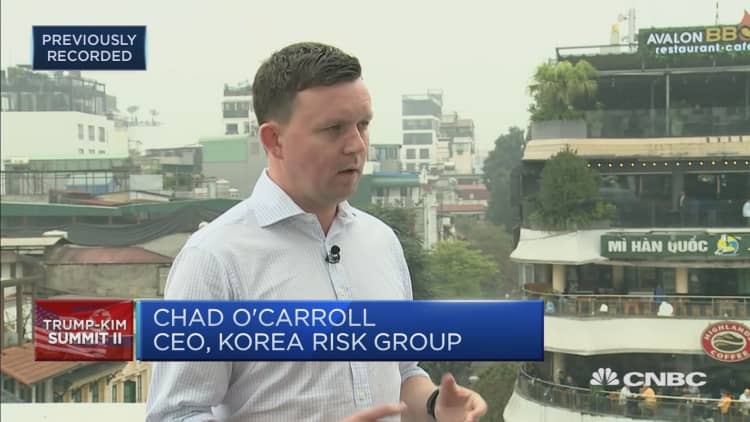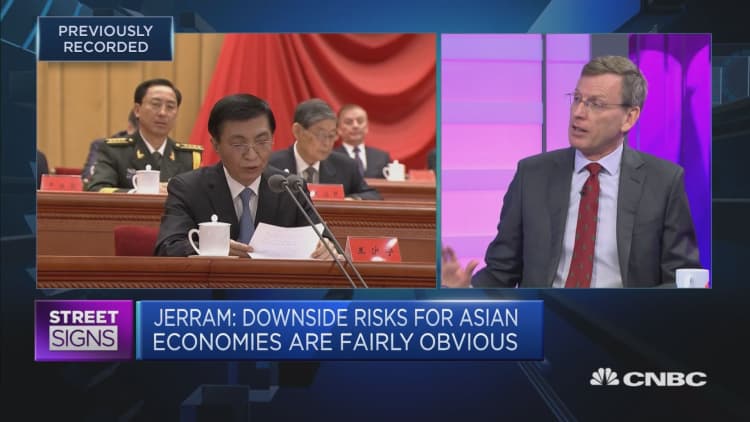Once-isolated and among the poorest countries in the world, Vietnam has over the last three decades emerged as a manufacturing hub where large multinational firms such as Intel, Samsung, Adidas and Nike have set up bases in.
"The country has already become a major exporter of textiles, electronic goods and footwear, among other items, with one in ten of the world's smartphones produced in Vietnam," Australian bank ANZ said in a recent report.
Powered by manufacturing, economic growth in Vietnam jumped from 2.8 percent in 1986 — when reforms were introduced — to 7.1 percent last year. The Southeast Asian country recorded its strongest expansion in more than a decade in 2018 and was one of the fastest-growing economies in the world that year.

Vietnam's ability to continue thriving at a time when global growth is stagnating has not gone unnoticed. In recent years, the country's ability to maintain political stability in the midst of economic transformation is seen as a model for North Korea to follow.
Like the hermit nation, the Southeast Asian country has been ruled by the same political entity, the Communist Party of Vietnam, since its independence in 1945. Vietnam was also once isolated — much like North Korea is now — for invading Cambodia in 1978.
"Vietnam offers North Korea the most realistic path for the massive and successful transformation of a communist one-party state with hostile relations towards the US into a politically stable, rapidly growing economy with good relations with most of its neighbours," Fitch Solutions wrote in a report.
Vietnam's opening up
Vietnam is still considered a lower middle-income country by the World Bank and a frontier market by major index providers — which means the country is thought to be less established and riskier to invest in. But that's still a long way from the time when it was one of the poorest nations in the world, economists noted.
Many experts have attributed Vietnam's rise to a series of policies called "doi moi" that were introduced in 1986 to grow the private sector and open up the country to foreign investors, among other things.
Source: ANZ Bank
Those policies "dramatically transformed the country, spurring fast economic and social development," Manop Udomkerdmongkol, economist at Singapore's United Overseas Bank, said in a recent report. "The key part of this reform was freeing up domestic trade and investment."
It came at a time that many factories wanted to diversify their manufacturing bases by moving some operations out of China, which resulted in a surge in foreign direct investments into cheaper destinations such as Vietnam.
In a report last year, World Bank economists said Vietnam has attracted more than 10,000 foreign companies, mostly in export-oriented and labor-intensive manufacturing sectors.
Vietnam now has one of the highest numbers of free-trade agreements among Asian countries.
That led to an improvement in several areas (all figures by the World Bank):
- Gross domestic product grew $26.337 billion in 1986 to $223.78 billion in 2017
- GDP per capita, a measure of wealth, increased from $421.659 in 1986 to $2,342.244 in 2017
Source: ANZ Bank
The government's reforms took advantage of Vietnam's foundations, including a young workforce, stable political climate and close proximity to major global supply chains, World Bank economists said in their report.
"Vietnam managed to capitalize on its strong foundations through good policies," the economists wrote.
"First, it has embraced trade liberalization with gusto. Second, it has complemented external liberalization with domestic reforms through deregulation and lowering the cost of doing business. Finally, Vietnam has invested heavily in human and physical capital, predominantly through public investments," they added.
Political grip vs economic gains
Pyongyang has for years studied market reforms in Vietnam and their impact on political stability, said Le Dang Doanh, a former advisor to the Vietnamese prime minister.
North Korean leader Kim Jong Un has allowed some markets in his country to develop, introduced more Special Economic Zones and called for factories to expand their product ranges to cater for diverse consumer tastes.

But some experts questioned the viability of North Korea following in Vietnam's footsteps, especially when much of the Southeast Asian nation's economic success was a result of opening up. There were also doubts about Kim's willingness to give up his country's nuclear weapons, which is required for sanctions to be lifted but may threaten the leader's iron-fisted rule.
"While North Korea's natural resources, geographical location and low labour costs mean its economy has plenty of potential, the likelihood of North Korea emulating the economic achievements of Vietnam are slim," Gareth Leather, senior Asia economist at consultancy Capital Economics, wrote in a recent note.
Leather pointed out, however, that while the ruling party in Vietnam has maintained "a firm grip on power," economic liberalization in other parts of Asia such as South Korea and Taiwan have partly led to the emergence of democratic movements.
— CNBC's Huileng Tan contributed to this report.
WATCH: Vietnam is a clear winner in the US-China trade war, says Bank of Singapore



